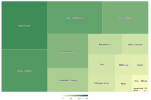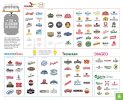Now I'm just your friendly neighborhood translator so don't go shooting at me. I believe the illustration points to the specious nature to the concept of "free market" as parroted by Americans, as well as the myth of competition within the American-inflection brand of "capitalism". Both critiques (the former usually more than the latter) are often resisted/rejected/dismissed by [self-described] upper middle class social conservatives, or folks with upper 20% national HHIs or higher. In fairness, this forum tends to be an echo chamber for said demographic, given the inordinate entry price for the hobby these days.
--brk brk--
As to inflation, I'm doing my part by removing my demand and exercising price elasticity. For the record, my current exit from the hobby is 100% due to the outsized increase in quoted labor and parts, and asking prices for replacement aircraft that specifically started in late 2020 and persist to present day. I had no issue with pricing points pre-2019 relative to my meager pay increases (some inflation-adjusted, most not). At any rate, it's an inconsequential step to take as an individual, but one I hope will continue to add into the demand softening that the Fed is attempting to achieve at the macro level.
We are fortunate in that we locked in housing costs in 2018, and transportation costs in 2019, so we should be able to ride out the stagflationary storm for at least the next decade. It won't be fun, but then again neither were the 1970s for many people. The rest is discretionary expenses we can cut out, and I'm sure we'll find some substitute goods/services to fill the gap to a copacetic level.
The one item where we have had to eat it (pun very much intended) is groceries. We don't find it prudent to significantly reduce our caloric intake just to keep inflation parity, so we exhibit quite a bit of price inelasticity when it comes to foodstuff and intake. We have cut out sit-in dining options, though in fairness that has had more to do with my wife's horrid work schedules opposite mine, which yield little time for the former "weekends together" pedestrian schedule. Be that as it may, we do hope that pressure contributes to aggregate softening demand in the economy. To wit, I've seen advertising for meal-delivery services for these vendors now offering payment plans.... oof, shark meet ski jump.
Our hearts go out to friends and neighbors who are having to eat less and more poorly, because they don't have the ability or willingness to undershoot housing the way we were lucky to. It's rough out there in main street, even if things are "normal normal good blinker" in upper middle class street.
Alright that's as far as I'll go into my socioeconomic commentary for the day, for the rest you'll have to wait for my first book out of retirement

(big demand for an audiobook offering, which has pleasantly caught me by surprise).





